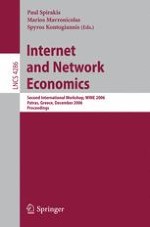2006 | OriginalPaper | Buchkapitel
Ranking Sports Teams and the Inverse Equal Paths Problem
verfasst von : Dorit S. Hochbaum
Erschienen in: Internet and Network Economics
Verlag: Springer Berlin Heidelberg
Aktivieren Sie unsere intelligente Suche, um passende Fachinhalte oder Patente zu finden.
Wählen Sie Textabschnitte aus um mit Künstlicher Intelligenz passenden Patente zu finden. powered by
Markieren Sie Textabschnitte, um KI-gestützt weitere passende Inhalte zu finden. powered by
The problem of rank aggregation has been studied in contexts varying from sports, to multi-criteria decision making, to machine learning, to academic citations, to ranking web pages, and to descriptive decision theory. Rank aggregation is the mapping of inputs that rank subsets of a set of objects into a consistent ranking that represents in some meaningful way the various inputs. In the ranking of sports competitors, or academic citations or ranking of web pages the inputs are in the form of pairwise comparisons. We present here a new paradigm using an optimization framework that addresses major shortcomings in current models of aggregate ranking. Ranking methods are often criticized for being subjective and ignoring some factors or emphasizing others. In the ranking scheme here subjective considerations can be easily incorporated while their contributions to the overall ranking are made explicit.
The
inverse equal paths
problem is introduced here, and is shown to be tightly linked to the problem of aggregate ranking “optimally”. This framework is useful in making an optimization framework available and by introducing specific performance measures for the quality of the aggregate ranking as per its deviations from the input rankings provided. Presented as inverse equal paths problem we devise for the aggregate ranking problem polynomial time combinatorial algorithms for convex penalty functions of the deviations; and show the NP-hardness of some forms of nonlinear penalty functions. Interestingly, the algorithmic setup of the problem is that of a network flow problem.
We compare the equal paths scheme here to the eigenvector method, Google PageRank for ranking web sites, and the academic citation method for ranking academic papers.
